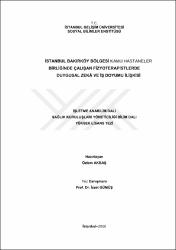| dc.contributor.author | Akbaş, Özlem | |
| dc.date.accessioned | 2018-12-06T06:50:43Z | |
| dc.date.available | 2018-12-06T06:50:43Z | |
| dc.date.issued | 2016-10-11 | |
| dc.identifier.uri | https://hdl.handle.net/11363/188 | |
| dc.description | Danışman: İzzet Gümüş | en_US |
| dc.description.abstract | Sağlık hizmetlerinin yaşamsal özelliği, hizmet üretiminde sağlık personelinin oynadığı rol insan kaynaklarının önemini arttırmaktadır. Verimliliği arttırmak, işin niteliğini yükseltmek, birlikte daha iyi işler yapabilmek için çalışanların duygu ve ihtiyaçlarına duyarlı olmak gerekmektedir Duygu, hareket halindeki enerjidir. Duygularını tanıyan insan duyguların içindeki muazzam enerjiyi nasıl kullanacağını bilen kâmil insandır. Duygusal zekâ deneyimlediğimiz duyguların farkında olmayı, diğerlerinin duygularını anlayabilmeyi, sosyal ilişkiler kurmayı, uyumlu ve mutlu çalışmayı sağlar. İş tatmini işe yönelik tutumdur. Tutum öğrenmeyle kazanılan bir olgu veya nesneye ilişkin değerlendirme sonucu oluşan tepki eğilimidir. Fizyoterapistler hasta ile birebir çalışan, kaliteli hizmetin kişiye bağlı olduğu bir mesleğin mensuplarıdır. Rehabilitasyonda; duygusal zekânın temellerini oluşturan beyinle ilgili çalışmaların sonuçları kullanılarak duyguların etkisi, duyguların bulaşıcılığı, ayna nöronlarla taklit yoluyla hastalara fonksiyonel davranışlar öğretilmeye çalışılır. Bu çalışmada Sağlık Bakanlığı İstanbul Bakırköy Bölgesi Kamu Hastaneler Birliğinde çalışan fizyoterapistlerde duygusal zekâ ile iş doyumu ilişkisi, duygusal zekâ ve iş doyumu düzeylerinin demografik, mesleki değişkenlere göre farklılık gösterip göstermediği incelenmiştir. Araştırmaya İstanbul Bakırköy Bölgesi Kamu Hastaneler Birliğinde çalışan 52 fizyoterapist dahil edilmiştir. Evrenin tamamına ulaşılan araştırmada elde edilen bulgular değerlendirilirken, istatistiksel analizler için SPSS 21.0 İstatistik paket programı kullanılmış ve sonuçlar % 95 güven aralığında, p<0,05 anlamlılık düzeyinde değerlendirilmiştir. Çalışmada elde edilen sonuçlara göre fizyoterapistlerin duygusal zekâlarının yüksek, iş doyumları orta, dışsal doyumlarının ise düşük olduğu belirlenmiştir. Duygusal zekâ ve iş doyumu arasında anlamlı ilişki çıkmamıştır. Ayrıca fizyoterapistlerin %96,2 gibi yüksek oranı mesleğin sağlığı olumsuz etkilediğini ifade etmiş ve %46,3'ü işten ayrılma niyetinde olduğunu belirtmiştir. Anahtar Kelimeler: Fizyoterapist, Duygusal Zekâ, İş Doyumu | en_US |
| dc.description.abstract | Due to vital feature of health services and the role of the health service production staff it increases the importance of human resources. To increase productivity, improve the quality of the work and to be able to work together better, it must be sensitive to the emotions and needs of the employees. Emotion is energy in motion. A man who recognizes his emotions knows how to use great power existing inside them. Emotional intelligence lets us be aware of the emotions that we experience, understand others' feelings, build social relationships and provides a harmonious and happy working atmosphere. Work satisfaction is an attitude towards work. Attitude is a fact achieved by learning or evaluation result of reaction towards a fact. Physiotherapy is a profession working one on one with patients which's quality service is dependent on a person. During rehabilitation the effect of emotions related with the brain form the basis of emotional intelligence. Contagiousness of emotions and functional behaviors are thought by using mirror neurons to patients. In this study, the relationship between emotional intelligence and job satisfaction levels, emotional intelligence and job satisfaction levels were examined that varies according to demographic and professional variables of physiotherapists working at Ministry of Health, Bakırköy Region Public Hospitals was investigated. A population of this study consists of 52 physiotherapists were included this study whow working at Ministry of Health, Bakırköy Region Public Hospitals. The results of the study were evaluated using SPSS 21.0 statistical analysis. 95% confidence interval and p<0.05 level of significance were chosen to evaluate the results. According to the results, physiotherapists tend to have high emotional intelligence, medium job satisfaction level and low external satisfaction levels. There wasn't any significant relations between emotional intelligence and job satisfaction. Moreover, 96,2% of the physiotherapists reported that their profession has a negative impact on their health and 46,3% of them intend to leave their job Keywords: Physiotherapist, Emotional Intelligence, Job Satisfaction | en_US |
| dc.language.iso | tur | en_US |
| dc.publisher | İstanbul Gelişim Üniversitesi Sosyal Bilimler Enstitüsü | en_US |
| dc.rights | info:eu-repo/semantics/openAccess | en_US |
| dc.subject | Research Subject Categories::SOCIAL SCIENCES | en_US |
| dc.subject | Research Subject Categories::MEDICINE::Psychiatry | en_US |
| dc.subject | Research Subject Categories::SOCIAL SCIENCES::Business and economics | en_US |
| dc.title | Bakırköy Bölgesi Kamu Hastaneler Birliği'nde Çalışan Fizyoterapistlerde Duygusal Zeka İş Doyumu İlişkisi | en_US |
| dc.title.alternative | The Relationship Between Emotional İntelligence and Job Satisfaction of Physiotherapists Working at the Ministry of Health Association of Istanbul Bakırkoy Region Public Hospitals | en_US |
| dc.type | masterThesis | en_US |
| dc.relation.publicationcategory | Tez | en_US |

















